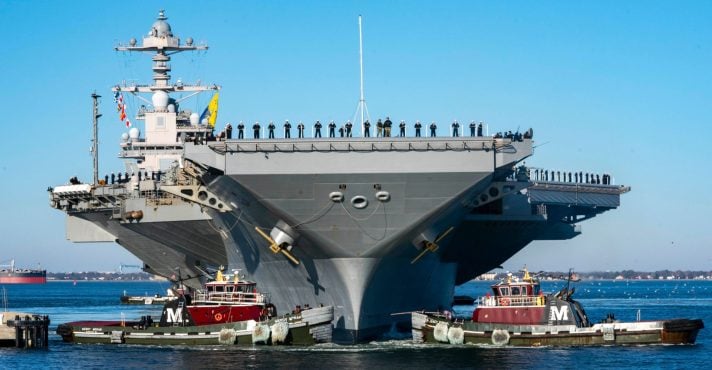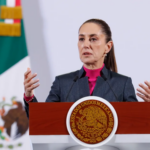
The United States government decided to reinforce its military presence in South America by sending the aircraft carrier USS Gerald Ford to waters close to the Caribbean and the South Atlantic. The announcement was made this Friday (24) by the Secretary of Defense, Pete Hegseth.
The movement occurs at the same time that Washington intensified attacks against vessels classified as linked to drug trafficking, increasing the number of deaths and increasing the climate of political and military instability in the region. The information is from The Globe.
The USS Gerald Ford is considered by the US Navy as the main platform for long-distance naval operations, with the capacity to launch combat aircraft and perform long-range monitoring. The vessel will be incorporated into the fleet already stationed under Southern Command (USSOUTHCOM), responsible for military operations in countries in Latin America and the Caribbean.
Official justification and strategic objective
According to Pentagon spokesman Sean Parnell, the aircraft carrier’s deployment aims to “detect, monitor and disrupt illicit activities that threaten the security of the hemisphere.” The US government claims that the operations focus on groups involved in drug trafficking and transnational criminal logistics.
Hegseth confirmed that, in the last few hours, the Department of Defense carried out the tenth attack of the month against vessels on the high seas. According to the secretary, the early morning offensive hit a boat attributed to the Venezuelan organization Tren de Aragua. Six people were killed. The US government reported that there were no records of casualties among US military personnel.
With this new incident, at least 43 people have died in similar naval operations in recent weeks, according to data presented by the Pentagon. All occurred in international waters in the Caribbean and eastern Pacific.
Escalation without Congressional approval
The deployment of the USS Gerald Ford comes after President Donald Trump stated that he intends to authorize ground operations against groups classified by the government as foreign terrorist organizations. The measure, according to legal experts consulted by the North American press, could set precedents for military actions without prior approval from Congress.
Trump has already ordered the CIA and the Department of Defense to adopt protocols for neutralizing and eliminating targets linked to groups and networks identified as international drug trafficking. In recent statements, the president stated that the US will treat these groups under the same parameters used against Al-Qaeda.
Reaction in South America
The intensification of the North American military presence provoked immediate responses from South American governments. Last Sunday, the president of Colombia, Gustavo Petro, stated that Washington’s accusations about alleged links between Colombian state agents and drug trafficking are unfounded. Petro also stated that military pressure on the Caribbean aggravates tensions and undermines regional diplomatic efforts.
In Venezuela, President Nicolás Maduro declared that the Bolivarian Armed Forces have remained on permanent alert since August. In a televised speech, Maduro stated that the country “does not want armed conflict”, but that it is prepared to protect its territory. The president highlighted the use of Russian Igla-S anti-aircraft systems, which had previously been cited by Venezuelan authorities as part of military cooperation programs with Moscow.
Maduro stated that Caracas maintains strategic relations with Russia and China and that bilateral agreements will allow the country to “guarantee its territorial security”.
Joint exercises and vessel deployment
In addition to the aircraft carrier, the US confirmed that the destroyer USS Gravely will arrive in Trinidad and Tobago on Sunday (26) for training with the local Armed Forces. The Pentagon declared that these exercises are in the nature of “maritime security cooperation”.
However, analysts consulted by research centers in South America estimate that the proximity to Venezuelan territorial waters increases the risk of incidents. Brazilian military sources interviewed privately by the press classified the sending of Gerald Ford as a “strategic demonstration movement”.
Diplomatic debate and possible developments
Experts in international law highlight that the set of recent actions signals a change in the US stance in relation to external operations, with less emphasis on diplomatic mediation and greater use of military instruments. The characterization of Latin American groups as terrorist organizations makes multilateral negotiations in international organizations difficult and may open space for legal disputes involving territorial sovereignty.
Meanwhile, governments in the region are closely monitoring the increase in maritime operations. Brazilian authorities stated that the country maintains its position in defense of the peaceful resolution of disputes and that it will not participate in direct actions in the Caribbean. Mexico’s foreign ministry issued a statement in which it reiterated its opposition to the use of unilateral military force.
Quadro regional
With military reinforcement and the expansion of operations classified as combating drug trafficking, the risk is growing that isolated episodes could evolve into diplomatic incidents or larger-scale clashes. The expansion of the North American fleet near the Venezuelan coast occurs at a time of regional economic fragility, political transition in several countries and strategic dispute between centers of global influence.
In the coming weeks, the focus will be on possible announcements of land operations or additional interceptions of vessels, as well as on political responses articulated by South American governments and multilateral organizations.
Source: https://www.ocafezinho.com/2025/10/24/eua-enviam-o-maior-porta-avioes-ao-caribe-e-tensao-cresce-entre-washington-venezuela-e-paises-vizinhos/

